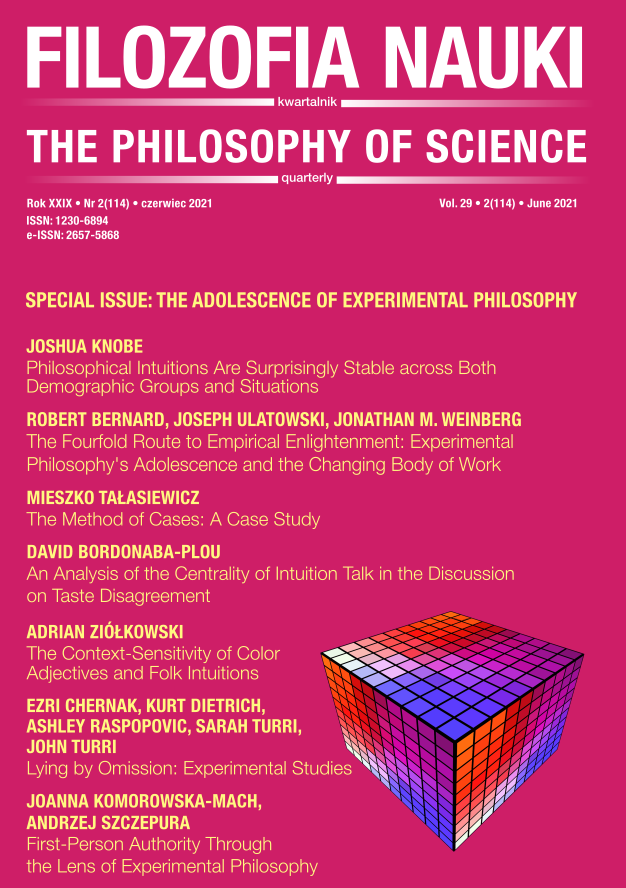The Method of Cases: A Case Study
DOI:
https://doi.org/10.14394/filnau.2021.0010Słowa kluczowe:
method of cases, Gettier cases, Fake Barn, Edouard Machery, methodology, metaphilosophy, theory of knowledgeAbstrakt
The aim of this paper is to propose an alternative interpretation of the method of cases, analyze two of its particular implementations in the theory of knowledge, and argue that the method of cases, according to this interpretation, is not prone to challenges posed by its recent critics, such as Edouard Machery (2017). The core of the proposed interpretation is that the method of cases consists of two steps (the case description and the target argument) and that the case description does not elicit judgments about the applicability of the concepts in question. In fact, case descriptions do not elicit anything at all; rather, they show some facts, usually some factual distinctions among relevant situations. Specifically, the Gettier cases and the Fake Barn cases show a certain differentiation in the ways of holding beliefs. How to adjust the concept of knowledge to such differentiation — if at all — belongs to the argumentative step.
Bibliografia
Będkowski M. (2020), “From Concepts and Contents to Connotations: Łukasiewicz’s Theory of Conceptual Analysis and Its Further Evolution” [in:] Formal and Informal Methods in Philosophy, M. Będkowski, A. Brożek, A. Chybińska, S. Ivanyk, D. Traczykowski (eds.), Leiden–Boston: Brill–Rodopi, 257-277. https://doi.org/10.1163/9789004420502_016
Cappelen H. (2012), Philosophy without Intuitions, Oxford: Oxford University Press. https://doi.org/10.1093/acprof:oso/9780199644865.003.0001
Cappelen H. (2018), Fixing Language: An Essay on Conceptual Engineering, Oxford–New York: Oxford University Press.
Deutsch M. (2015), The Myth of the Intuitive: Experimental Philosophy and Philosophical Method, Cambridge, MA: The MIT Press. https://doi.org/10.7551/mitpress/9780262028950.001.0001
Gettier E. (1963), “Is Justified True Belief Knowledge?,” Analysis 23: 121-123. https://doi.org/10.1093/analys/23.6.121
Goldman A. (1976), “Discrimination and Perceptual Knowledge,” Journal of Philosophy 73(20): 771-791. https://doi.org/10.2307/2025679
Jadacki J. J., Simons P. (eds.) (forthcoming), The Notion of Causality in the Lvov-Warsaw School, Leiden–Boston: Brill–Rodopi.
Klein P. D. (1971), “A Proposed Definition of Propositional Knowledge,” Journal of Philosophy 68(16): 471-482. https://doi.org/10.2307/2024845
Lehrer K., Paxson T. (1969), “Knowledge: Undefeated Justified True Belief,” Journal of Philosophy 66(8): 225-237. https://doi.org/10.2307/2024435
Levin J. (2019), “A Case for the Method of Cases: Comments on Edouard Machery, Philosophy within Its Proper Bounds,” Philosophy and Phenomenological Research 98(1): 230-238. https://doi.org/10.1111/phpr.12568
Łukasiewicz J. L. (1906), “Analiza i konstrukcja pojęcia przyczyny,” Przegląd Filozoficzny 9(2-3): 105-179.
Machery E. (2017), Philosophy within Its Proper Bounds, Oxford: Oxford University Press. https://doi.org/10.1093/oso/9780198807520.001.0001
Machery E. (2019a), “Response to Janet Levin and Michael Strevens,” Philosophy and Phenomenological Research 98(1): 246-255. https://doi.org/10.1111/phpr.12567
Machery E. (2019b), “Response to Akagi, Hughes, and Springle,” International Journal of Philosophical Studies 27(4): 608-623. https://doi.org/10.1080/09672559.2019.1655950
Recanati F. (2012), Mental Files, Oxford: Oxford University Press.
Sosa E. (2007), “Experimental Philosophy and Philosophical Intuition,” Philosophical Studies 132(1): 99-107. https://doi.org/10.1007/s11098-006-9050-3
Springle A. (2019), “The Method of Cases in Context,” International Journal of Philosophical Studies 27(4): 597-608. https://doi.org/10.1080/09672559.2019.1656855
Strawson P. F. (1992), Analysis and Metaphysics: An Introduction to Philosophy, Oxford–New York: Oxford University Press.
Tałasiewicz M. (2020), "Metareflection: A Method for Philosophy" [in:] Formal and Informal Methods in Philosophy, M. Będkowski, A. Brożek, A. Chybińska, S. Ivanyk, D. Traczykowski (eds.), Leiden–Boston: Brill–Rodopi, 9-40.
Thomson J. J. (1971), “A Defense of Abortion,” Philosophy and Public Affairs 1(1): 47-66. https://doi.org/10.1007/978-1-4615-6561-1_6
Turri J. (2012), “Is Knowledge Justified True Belief?,” Synthese 184(3): 247-259. https://doi.org/10.1007/s11229-010-9773-8
Turri J. (2016), “Knowledge Judgments in ‘Gettier’ Cases” [in:] A Companion to Experimental Philosophy, J. Sytsma, W. Buckwalter (eds.), Chichester: Wiley & Sons, 335-348. https://doi.org/10.1002/9781118661666.ch23
Unger P. (1968), “An Analysis of Factual Knowledge,” Journal of Philosophy 65(6): 157-170. https://doi.org/10.2307/2024203
Williamson T. (2007), The Philosophy of Philosophy, Malden, MA: Blackwell.
Ziółkowski A. (2017), “Experimenting on Contextualism: Between-Subjects vs. Within-Subjects,” Teorema 36(3): 139-162.
Ziółkowski A. (2021a), “The Stability of Philosophical Intuitions: Failed Replications of Swain et al. (2008),” Episteme 18(2): 328-346. https://doi.org/10.1017/epi.2019.20
Ziółkowski A. (2021b), “The Context-Sensitivity of Color Adjectives and Folk Intuitions,” Filozofia Nauki 29(2) [114]. https://doi.org/10.14394/filnau.2021.0012



















 Filozofia Nauki | ISSN 1230-6894 | e-ISSN 2657-5868
Filozofia Nauki | ISSN 1230-6894 | e-ISSN 2657-5868